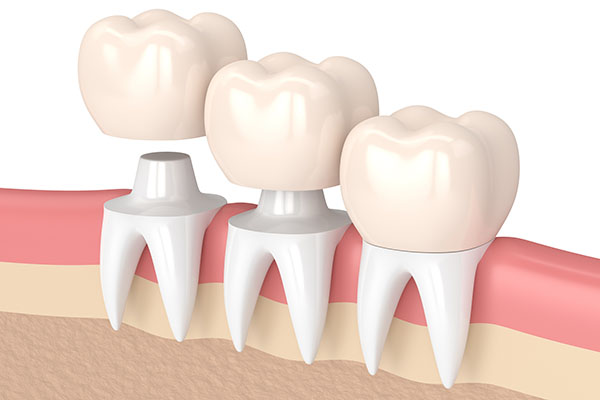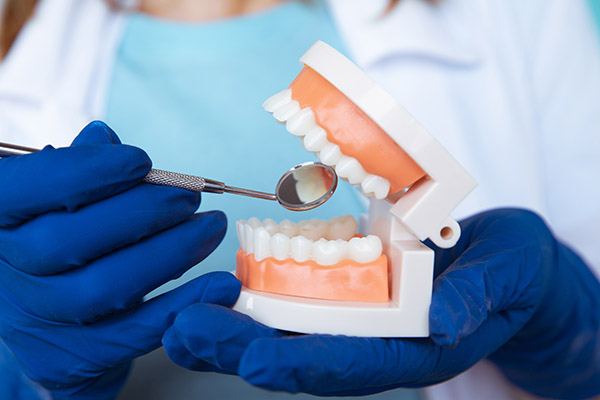 Dental crowns are supposed to last forever, right? In the right set of circumstances, they could. Some crowns will last several decades while others will last a lifetime. Then there is the dental crown that comes loose for one reason or another. A loose crown means that a trip to the dentist is in the cards for you, so get on that. In the meantime, here is what to do with a loose dental cap.
Dental crowns are supposed to last forever, right? In the right set of circumstances, they could. Some crowns will last several decades while others will last a lifetime. Then there is the dental crown that comes loose for one reason or another. A loose crown means that a trip to the dentist is in the cards for you, so get on that. In the meantime, here is what to do with a loose dental cap.
What a loose dental crown feels like
Should a dental crown have any play or wiggle? The answer is no. Dental crowns bond onto the underlying tooth with bonding or some other type of dental adhesive. This means that the crown should be immovable, just like a healthy tooth. There are several other tell-tale signs that a dental crown is loose:
- Tooth sensitivity to heat, air, pressure, and certain foods.
- Food getting stuck at the gum line, where the crown meets the gums.
- Pain or throbbing in the underlying tooth.
- Visible cracks, breaks, and fractures.
Ideally, a crown will stay intact barring situations like an old crown, teeth grinding, continued tooth decay, and injury. Poor workmanship on the part of some dentists could also result in ill-fitting crowns. Habits like chewing on hard or sticky foods can also pull a crown loose. Here is what to do when a dental crown comes loose. Keep in mind that these are stop-gap measures:
1. Temporary dental cement for a temporary fix
This fix only applies to a completely loose crown. It should take zero effort or pain to lift the crown off the tooth. Remove the loose crown and use a toothbrush to scrub off any remaining dental cement. Rinse the crown and the now-exposed tooth. Clean the tooth as thoroughly as possible. Next, dry both the crown and the tooth with gauze. Lastly, apply dental cement to the inner surface of the crown and place it on top of the tooth. Allow the cement to set by biting down on a small roll of gauze.
2. Leave the crown alone if it is still bonded to the tooth
Pulling out a crown that still attaches to the underlying tooth can cause even more damage. The best remedy for such a scenario is to see a dentist as soon as possible. In the meantime, take care to clean around the gumline.
3. Sugar-free gum
Cracks, breaks, and fractures can loosen a crown and expose the inner tooth. If the crown still adheres to parts of the tooth, encase it with sugar-free gum. The gum will form a temporary barrier against food particles and other unpleasant substances. This is a temporary measure that tides the patient over as they wait to see their dentist.
Restore the lost glory of your crown, starting with a simple phone call
The sooner you get a dentist to re-fit your dental crown, the better. That is why you should make an appointment with our practice right now. Our dentist has a masterful hand and years of experience fitting dental caps. They have the testimonials of many happy patients to show for it. Join the long queue of happy patients and see your crown last for many, many years.
Request an appointment or call R. David Brumbaugh, DDS at 214-306-4402 for an appointment in our Dallas office.
Related Posts
Dental crowns are durable and effective for restoring damaged or weakened teeth. They improve the tooth's structure and function while also enhancing your smile's appearance. However, proper maintenance can extend their lifespan and ensure long-term oral health. With the right care, these restorations can last several years, providing a reliable and aesthetically pleasing restoration.A consistent…
Dentists use dental crowns to preserve the integrity of the remaining natural dental structure. There are cases when cavities keep getting worse. Lack of routine dental checkups and poor dental care can lead to deeper cavities. This often leads to larger fillings with each dental check. If you want to know how dental crowns can…
Curious about whether you need a dental crown after a root canal? Read on to learn more. Many patients believe that a root canal is a painful procedure and therefore avoid it. In cases of seriously damaged or infected teeth, root canals are the last resort to prevent an extraction. After the root canal treatment,…


